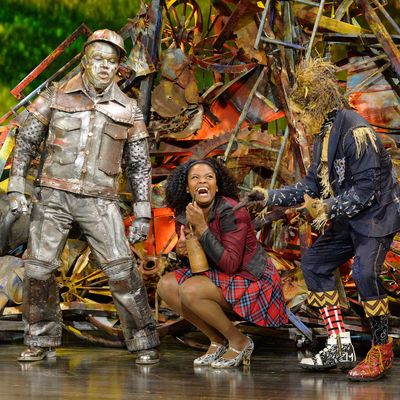
Only in a weak Broadway field could The Wiz have won seven Tony awards, as it did in 1975. Its competition included Mack & Mabel, Shenandoah, and The Lieutenant (which ran for two weeks). What The Wiz was was a hit, eventually riding out four years on its delightful pop-funk-gospel score and its winking minstrelsy. Perhaps that crossover success is what made it attractive to NBC as the third in its series of attempted holiday resurrections of the live-musical-on-TV genre; the first attempt, a lugubrious Sound of Music two years ago, seemed square and fogeyish, and the second attempt, a poorly cast and underrehearsed Peter Pan, was a flat-out disaster. Avoiding both of these fates, The Wiz Live! (as we are obliged to style it) snuck by last night as the best installment yet: It was well cast under the circumstances, very well sung, and, as a result, intermittently diverting. Also diverse: As last night’s three-hour Twittergasm noted, the roster of black pop stars performing “urban” music made for a refreshing change from the series’ nearly all-white and all-oldie predecessors. But that doesn’t mean it was good.
It helped that The Wiz — an adaptation of the familiar Wizard of Oz story featuring black performers and tropes — is an ensemble piece; its narrative is more or less evenly distributed among nine main players. The television version did not depend, as the previous two did, on finding one star who could command a TV audience and do justice to a difficult central role. Instead, the producers were able to hire a pleasant unknown (Shanice Williams) as Dorothy and share the rest of the wealth, and the burden, among a group of performers who are each moderate draws and moderately apt: Mary J. Blige as the one-song Evilene, Queen Latifah in the reconfigured title role, the R&B star Ne-Yo as Tin Man, et al. (In a lovely touch, Stephanie Mills, the original Dorothy, played Auntie Em.) For the most part these performers nailed their solos, though none of them did so as convincingly as those clearly trained for the stage: Elijah Kelley as Scarecrow and, wonderfully if briefly, Uzo “Crazy Eyes” Aduba as Glinda.
But Aduba’s fierce attention to the other actors, and the unfakeable liveness of her voice — by which I mean its direct connection to emotion — also demonstrated, in the show’s final segment, what had been missing till then. Even in silly musicals featuring fantastical plots, with actors bizarrely singing and dancing their feelings, the feelings must be real and vivid. The Wiz, onstage and, especially, as presented live on TV, does not make that easy. (The movie version, headlined by Diana Ross and Michael Jackson, is by now a camp classic.) What can be finessed with a little style by a seasoned Broadway triple threat gets flattened in high definition; there is something overwhelmingly literal about live television. (The heavy use of rear-projected LED scenery behind the actors only exaggerated that effect.) The big dance numbers, despite Cirque du Soleil performers bounding about as flapping crows and gyrating poppies, mostly laid eggs. Worse, but by now traditional, the pacing was patchy, leaving weird holes in the action through which the show’s energy seeped away. Neither the stage direction (by Kenny Leon) nor the camera direction (by Matthew Diamond) solved those problems. When it came time for a commercial — and it came time for a commercial every three minutes, it seemed — everyone just stood there, staring.
If the material was thus spoon-fed in tiny batches, it was likewise sweetened and puréed; Harvey Fierstein’s rewrite of the really quite bad original book (by William F. Brown — and, yes, it was nominated for a Tony*) included somewhat desperate attempts at updated jokes and lingo. (“Oh, snap!”) But Fierstein also corrected some of the story’s underpinnings in ways that paid off, or would have if so many weren’t still left uncorrected. And that, finally, was the problem with the broadcast: It applied a middle-of-the-road sensibility to material that is strictly second-rate. I’m not sure that any live musical could succeed (artistically) on television today; the mediums are mostly incompatible, one hot, one cold. But then The Wiz isn’t a fair test; I’m not sure it could succeed artistically onstage today either. (We may find out; NBC has suggested that a version of this production may appear on Broadway next year.) In any case, I would like to offer the radical suggestion that the next musical to receive the live-with-exclamation-point treatment be one that’s actually great, not merely compliant: something like Company with (if we must have a television star) Terrence Howard. At least we’d be spared the mortification of the poppies.
*This sentence has been corrected.

